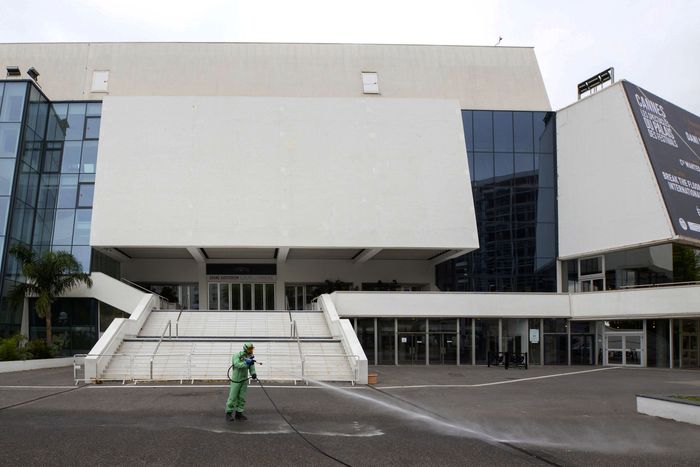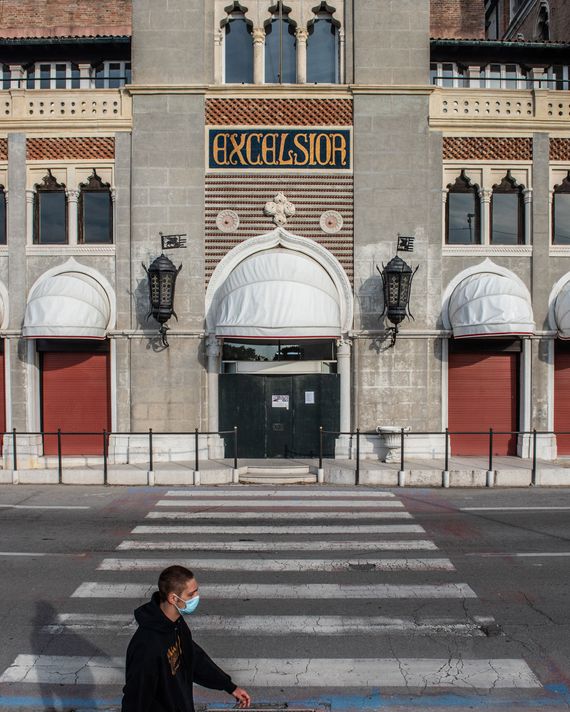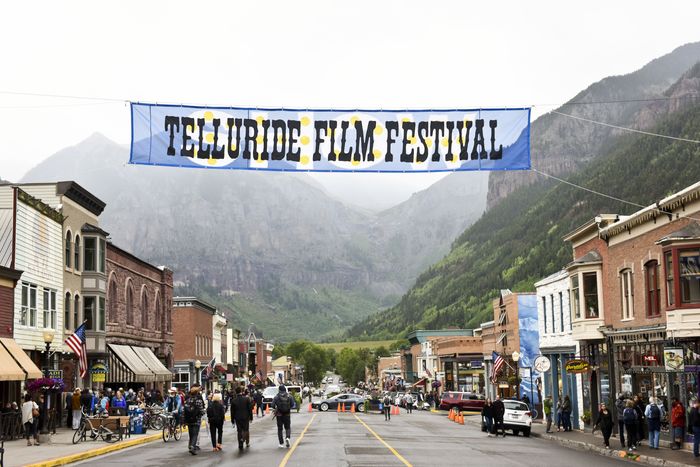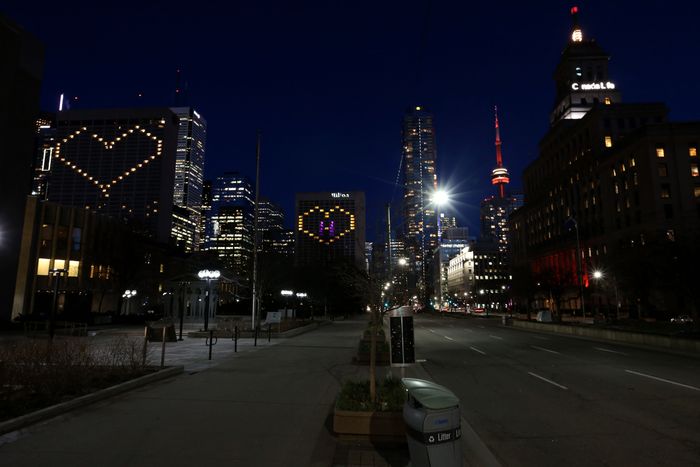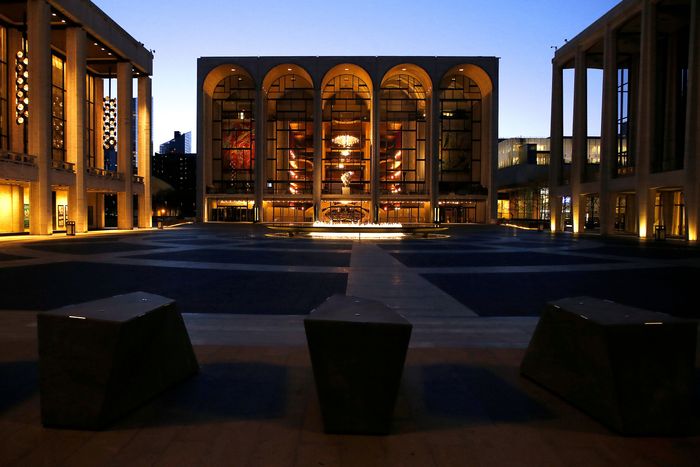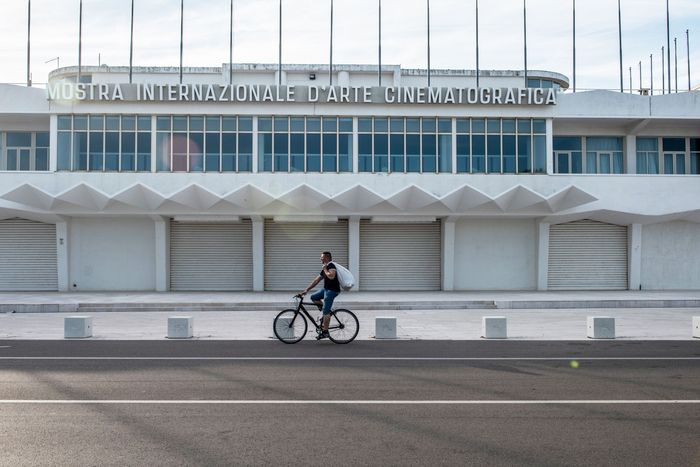
It is hard to think of an event less suited to the age of the coronavirus than a film festival — thousands of strangers from all over the globe coming together to sit in packed screening rooms for a few hours and, if they’re lucky, mingle at an after-party where they’ll have a chance to share hors d’oeuvre with an Oscar winner. As the film industry spends its fifth month in lockdown, the red stairs, elegant gowns, and swanky parties are no more. In a postapocalyptic touch, the Boulevard de la Croisette is being patrolled not by paparazzi but by a feral boar:
Hope springs eternal that festivals will occur again at some point. As Parasite’s Best Picture–winning campaign proved, nothing creates buzz for a movie like a successful fest premiere, and for Oscar-watchers, the late-summer festivals separate the season’s wheat from the chaff, the Roma from the Life Itself. There are supply-side incentives preventing this year’s slate from being canceled outright, too: Many festivals provide the revenue that funds their parent operations the rest of the year. Finally, many in the industry have clung to the return of festivals as a symbolic step on the road to normal, a sign that movies are finally back.
There are numerous hurdles to getting there, besides the obvious question of safety. As Noah Cowan notes on IndieWire, the physical presence of celebrities is often the secret ingredient behind many festivals staying in the black; would an appearance over Zoom hold the same cache? For festivals that have built their brand on glamorous exclusivity, simply providing screening links for people to watch at home may be an uncomfortable experience in demystification. And while the FOMO a film festival brings out in those who aren’t there is a key part of their appeal, that vibe may hit differently in the age of quarantine: Amid a global pandemic, could anyone post from Venice without feeling like an asshole?
So how are each of the major festivals planning for life in the corona era? As anyone trying to organize one will tell you, nothing is concrete and the facts change every day. But here is provisional look at where things stand at the end of July.
This post will be updated as more information becomes available for each festival.
Cannes Film Festival
With its mid-May fete imperiled by the coronavirus, Cannes initially hoped that a simple delay would suffice: first to late June, then, after the French government extended its lockdown into July, indefinitely. But on the eve of what had been its scheduled opening, the festival bowed to circumstances, confirming to Variety that there would be no physical edition of Cannes this year. “A ‘festival’ is a collective party, a spectacle that brings together an audience in a given location, in this case on the Croisette, in the presence of thousands of people. Everyone understands that that’s impossible this year,” Cannes director Thierry Frémaux told Screen Daily a few days earlier. While other spring festivals like Tribeca and SXSW compromised by going virtual, Cannes considered such an option antithetical to the spirit of the event. “Cannes could only have taken place as it normally does with the stars, the public, the press and the professionals,” Frémaux said. “The festival should always show its best face.”
Instead, on June 3, organizers announced a selection of films that would have been included in this year’s official lineup, which will be taken to festivals later in the year with “Cannes 2020” branding. These include Wes Anderson’s The French Dispatch, François Ozon’s Summer 85, Francis Lee’s Ammonite, and Steve McQueen’s Lover’s Rock and Mangrove. Per Variety, other films have decided to take their chances to submit for Cannes 2021 instead, among them Leos Carax’s Annette and Paul Verhoeven’s Benedetta. Then there are films like Spike Lee’s Vietnam War drama Da 5 Bloods, which would have played out of competition and instead went straight to Netflix on June 12. (A move probably made easier by the academy’s decision to allow streaming-only films to compete at next year’s Oscars.) Incidentally, that will be the last Netflix film to be associated with a film festival this year: According to IndieWire, the streamer will not be sending any of its Oscar hopefuls to Venice, Telluride, Toronto, or New York.
Meanwhile, the Marché du Film, an industry sales convention that takes place alongside the festival and typically features the schlockiest movies imaginable, took place entirely online.
Venice International Film Festival
With Italy having been hit hard by the pandemic, the question of how to go ahead with the world’s oldest film festival has been particularly fraught. Unlike Cannes, Venice projected confidence early: In late April, the Venice Biennale, which organizes the festival, told Italian media that they were proceeding with the traditional early-September date as planned, with the expectation that the event would be scaled down and take place in “six or seven circumscribed movie theaters.”
In late June, Variety reported more details on what a post-COVID-19 Venice will look like. Films will screen in multiple theaters simultaneously, necessitating a smaller lineup. (There will also be outdoor screenings.) Red carpets will still happen, albeit with socially distanced photographers. Though Italy’s reopening guidelines mandate no more than 200 people in a theater at once, the festival will receive a special dispensation for its largest screening rooms.
With Italy still banning entrance to visitors from outside the E.U., U.S. attendance is expected to be limited. However, in April, Biennale president Roberto Cicutto floated the possibility of an online option for international press. The following month, a letter from artistic director Alberto Barbera offered more information on this front, confirming the festival was indeed exploring the idea of presenting a “virtual screening room” for accredited attendees unable to make it to the Lido.
While Cannes’s Frémaux often mentioned that Venice could be the launching pad for the “Cannes 2020” label, the Italians had publicly taken a more skeptical tone, and according to Variety a partnership between the two festivals appears no longer to be in the cards. However, Venice’s competition slate is expected to include multiple films that dropped out of Cannes, including Nanni Moretti’s Tre Piani and Maïwenn’s DNA.
Telluride Film Festival
Telluride is a more intimate festival than the others; instead of a major city, it takes place in a small resort town in Colorado over Labor Day weekend. Ultimately, that made it too much of a risk. Two months after promising a socially distanced version of the festival, organizers reversed course, announcing in July that the 2020 edition would be scrapped entirely. “After months of intense due diligence around physically holding an event, we’ve come to the heartbreaking but unanimous conclusion to cancel this year’s Labor Day celebration of film in Telluride,” they wrote in a statement. “With a seemingly unending number of new cases of COVID-19 and the national chaos around it, even the best strategy is threatened by this out of control environment.”
Toronto International Film Festival
TIFF has a reputation for being the most accessible of the major festivals, and accordingly, it’s going experimental with its changes. In late June, organizers announced that, besides physical screenings, this year’s festival would be “tailored to fit the moment” with an assortment of shifts, including drive-in and digital screenings, plus virtual red carpets, press conferences, and panel discussions.
Like Venice, TIFF is also presenting a smaller lineup this time around: Though the festival typically programs over 200 films, this year that’s down to 50 new features. Those premieres will occur in socially distanced physical screenings that take place over the festival’s first five days. The official selection includes “Cannes 2020” titles like the lesbian fossil romance Ammonite, the Mads Mikkelsen drinking comedy Another Round, and the Japanese family drama True Mothers, as well as Halle Berry’s directorial debut Bruised. The opening-night film will be Spike Lee’s concert doc of David Byrne’s American Utopia. More will be announced over the course of the summer, with Wes Anderson’s The French Dispatch rumored to be among them.
Out-of-towners need not scrounge for their passports. In an email sent to media at the end of July, TIFF announced that press and industry screenings will take place entirely digitally, and there will be no other in-person events. “Press should not plan to travel to Toronto,” organizers wrote. The festival will retain an air of exclusivity thanks to artificial scarcity: The number of press passes will be lower than usual, and not every film playing TIFF will be available to screen digitally.
New York Film Festival
NYFF takes place in late September, which gives organizers extra time to prepare but could also place the festival in the middle of the dreaded “second wave” of infections. In recent years, New York has moved away from world premieres, choosing instead to present the best of the films that debuted elsewhere, but if travel restrictions remain in place through the summer, NYFF’s good fortune to take place in the city where much of the industry and media already lives could make it the first place American viewers get to actually see the year’s best films.
New York City has also seen more coronavirus cases than anywhere else in the U.S., and residents’ fears over large gatherings are unlikely to dissipate by autumn. In a statement, the festival’s parent organization, Film at Lincoln Center, announced it would be deciding the format of this year’s NYFF over the summer, balancing “its commitment and responsibility to films and filmmakers while ensuring that the safety and well-being of our audiences and guests remain our utmost priority.”
Organizers are determined to put on a brave face. “It may be quieter in some ways … but constraints often inspire creativity, and New Yorkers are resilient,” festival director Eugene Hernandez told THR. “Sure, there may be fewer throngs of press and people at some screenings. It may be more intimate, but we will find new ways to continue to support the art. We will adapt.”
Sundance Film Festival
Finally, we come full circle with the Sundance Film Festival, whose 2020 edition was the final festival to proceed more or less as normal (and which may have been a secret breeding ground for the virus). In a memo sent to the festival’s mailing list, new director Tabitha Jackson announced she was “actively planning” a series of possible changes for Sundance 2021 in the event that no coronavirus vaccine is yet available.
Most notable would be the expansion of the festival outside the traditional confines of Park City, with selections playing in 20 independent and community theaters across North America. For those unwilling or unable to make it to a theater, Sundance will also create an online hub for screenings and live events. Organizers are also mulling a different start date for the 2021 festival, currently scheduled to kick off January 28, in order to create more distance from the presidential inauguration on January 20.



